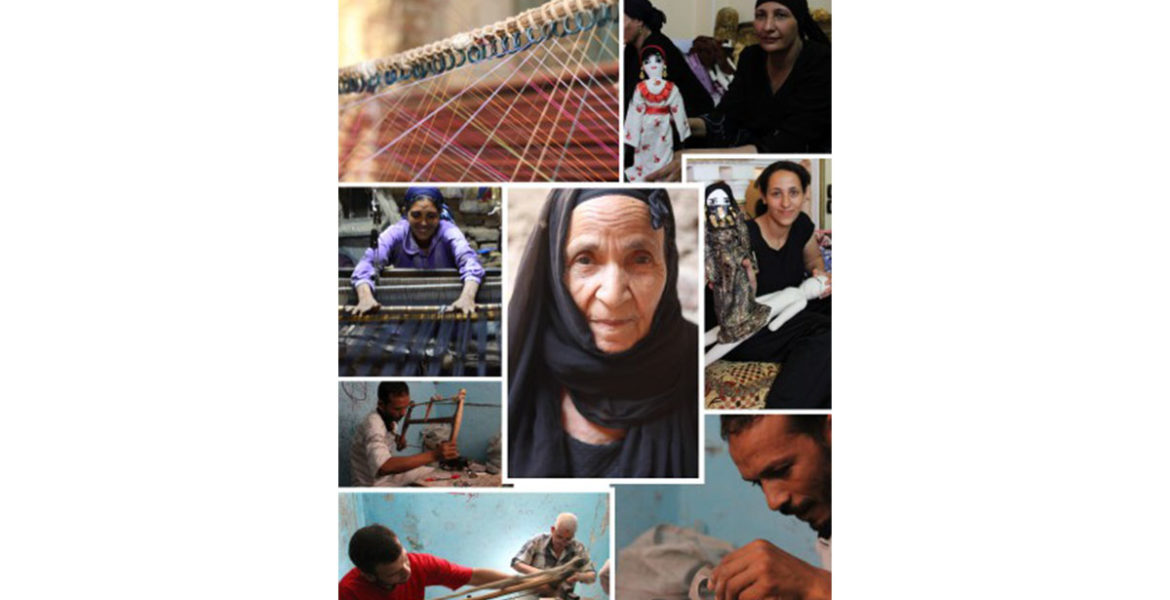Egypt is the home of plenty of talents. Unfortunately, most of them stay in the dark. This is due to many reasons, from being shamed for not having a desk job to lack of government support. In comes Fair Trade Egypt, offering overlooked, disadvantaged artisans marketing and support. The Fair Trade Egypt store is a goldmine for arts and crafts made by Egyptians. When you shop there, you can be certain that the artisan behind your product was treated with fairness. We spoke to three of Fair Trade’s finest artisans. The more we knew about them, the more respect we had for them.
Mariam
Mariam started making scarves back in 1994. Now – at the age of 44 – she is responsible for a workshop. A group of young ladies make scarves – under her supervision – to be sold at Fair Trade Egypt. Weaving is nothing out of the ordinary for Mariam. In fact, she inherited the craft. Coming from a family of weavers, she took the same path.
Working in arts and crafts isn’t easy. It is a difficult career path to take, “the community looks down upon arts and crafts, and this makes the youth turn away from taking it as a career. They look for bigger things”, Mariam says.
Although the community doesn’t encourage this kind of work, Fair Trade helped make things a little easier, “they help us a lot in marketing and developing our products. They let us know what the market demands. They’re our only means of marketing,” she says.
Weaving is more than a job to Mariam, it is her heritage. The fact that it’s a dying art isn’t easy for her to accept, “I hope we get more attention. This is our heritage, and we can’t let it die out. Even tourists appreciate it more than Egyptians. There needs to be more exposure for handcrafts”, she tells.
To Mariam, this is not just her means of making a living. She is passionate about it, “I love what I do. We’re educated, and we use that in our line of work. I use the internet now to know all that’s new and use it for work”, she concludes.
Mirvette
Unlike Mariam, Mirevette isn’t a veteran. She has only been producing handcrafts for four years. Nevertheless, there is a high demand on the dolls she makes. It is hard to believe that she learned a craft so specific on her own. It is true, though, Mirvette is self-taught. She started making dolls when she was 23 using a needle and thread. She didn’t have equipment, sewing machines or the proper fabrics.
Her mother noticed that her daughter had a genuine talent. So she started helping her out. She taught her how to make clothes and how to use a sewing machine. Her husband wasn’t as supportive in the start, though, “he wanted me to stay home and give all my attention to the kids, but when he saw that I can be successful at this, he’s become very supportive. He loves what I do now”, she says.
Mirvette is quite the optimist. She strongly believes that if you are passionate about what you do, you can accomplish anything, “as long as it comes from within and there’s encouragement, you’ll be able to create something”, Mirvette says.
‘Am Abdallah
If we thought Mariam was a veteran, ‘Am Abdallah has to be a legend! The man, now 64, first learned to make artifacts from cow’s horns in the 1960s. He was taught in a school established during Nasser’s reign in Beheira. The school had teachers from Khan El Khalili give handcrafting lessons to the youth who joined. This craft is not only important for its artistic value, it also helps the environment. It makes use of cow’s horns which are usually discarded and burned, causing pollution. ‘Am Abdallah knows this very well and takes pride in it, “my work relies on discarded material. Ever imagined that something that pollutes the environment could bring out such beautiful artifacts?” He says.
‘Am Abdallah, like Mirvette and Mariam, knows the importance of passion, “you must love what you do if you want to create decent work”, he stresses. As well as that, he was fortunate enough to find support, “people are supportive. It’s a good job that supports entire families”, he says, “Fair Trade helped us a lot. They provided us with equipment, markets and fairs”.
As for what craftsmanship needs to thrive, ‘Am Abdallah, like Mariam and Mirvette, stresses on the importance of marketing, “there have to be markets and fairs to put our work on display”, he concludes.

